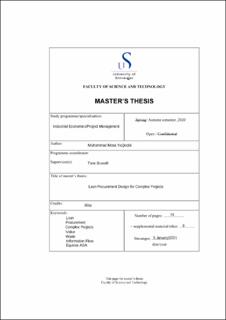| dc.contributor.advisor | Bruvoll, Tone | |
| dc.contributor.author | Yaqoobi, Muhammad Mosa | |
| dc.date.accessioned | 2021-03-22T14:13:25Z | |
| dc.date.available | 2021-03-22T14:13:25Z | |
| dc.date.issued | 2021-01-05 | |
| dc.identifier.uri | https://hdl.handle.net/11250/2734887 | |
| dc.description | Master's thesis in Industrial economics. | en_US |
| dc.description.abstract | Lean philosophy developed and successfully practiced by Toyota with aim to deliver value, reduce waste through culture of continuous improvement. The philosophy has inspired both manufactur ing and service industries to practice the lean work ethics. Because of its robustness and simplicity it is being implemented to inter alia health, education and information management sectors. Lean philosophy has helped companies to sustain growth at the time of financial crisis and shrinking economy.
Intrigued by successful implementation of Lean philosophy in service industry and knowledge work such as product development, the thesis is aimed to study implementation of Lean philosophy to procurement as a support function for complex project. For the purpose experts input from Equinor ASA are collected in a series of interviews dual with a desk-research and thorough analysis of previously published research papers. For a successful implementation of Lean to any process it is important to translate the lean propositions in proper logical manner to the frame of working of the process it is intended to be applied to.
The theory behind Value and Waste in procurement of complex project will be discussed with experts. And 7 types of wastes defined by Toyota Production System (TPS) will be compared with wastes in procurement. The thesis will also study the Information Flow in procurement. A suc cessful implementation of Lean also needs a good relation with supplier, in this regard two working models with suppliers are discussed with experts in Equinor ASA.
The study finds an unequivocal definition of value proposition in procurement in complex projects. Quality and Cost efficiency are considered as salient factors for value deliverance in procurement. The concept of waste is also unambiguous in procurement but the context it is applied to differs from manufacturing . Among the 7 wastes defined by TPS only four remained pertinent to pro curement. The study identified two major wastes in Information Flow namely Overproduction of Information and Defective Information, both the wastes can further cause waiting and delays. The thesis finds the digital tools used for communicating, retrieving information are functioning well in the organization. The thesis identified key elements which makes procurement in complex projects different from discrete manufacturing. These includes Risk, Uncertainty, Uniqueness, Complexity and Innovative nature of projects. A successful implementation of Lean to procurement in complex projects needs the organization has to become a learning organization.
The thesis finds Organic model is a good fit for supplier relation in procurement of complex projects. The model enables an enhanced understanding and trust between procurer and supplier, that will pave the path for successful implementation of Lean philosophy to procurement. But the organic model has also its limitations. In the end of the thesis some lean tools are suggested which are helpful in procurement in identifying wastes and eliminating them.
The thesis is based on Qualitative study for implementation of Lean in procurement. For further research Quantitative study using lean tool Value Stream Mapping is suggested. The tool maps the current flow of working to as detail as activity level and identifies concrete wastes in flow. | en_US |
| dc.publisher | Stavanger, University of Stavanger | en_US |
| dc.relation.ispartofseries | Masteroppgave/UIS-TN-ISØP/2020; | |
| dc.subject | Lean | en_US |
| dc.subject | Equinor ASA | en_US |
| dc.subject | industriell økonomi | en_US |
| dc.subject | complex projects | en_US |
| dc.subject | procurement | en_US |
| dc.subject | waste | en_US |
| dc.title | Lean Procurement Design for Complex Projects | en_US |
| dc.type | Master thesis | en_US |
| dc.subject.nsi | VDP::Samfunnsvitenskap: 200::Økonomi: 210 | en_US |
